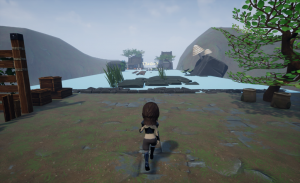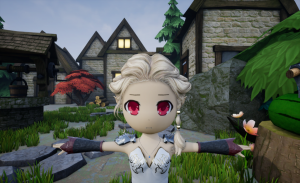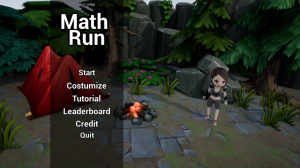
Math Run is a free digital game that can be downloaded through Bournemouth University database and run on a computer or laptop. Using the keyboard, players must navigate their avatar through a virtual environment whilst solving mathematics equations, dodging pumpkins and collecting treasures. The game is played individually, and is a fun, engaging way to encourage players to practice their maths skills.
Basic information
Definition:
Math Run is an ‘infinite runner’ game that can be played on a computer or a laptop. The game challenges players on a variety of skills including: dodging pumpkins; navigating rivers; answering mathematic equations; collecting treasures; and earning virtual currency.
The game serves as an interactive learning environment that encourages players to learn through gameplay and enhance their mathematic ability.
Objectives
The player is challenged with navigating their avatar through a series of tasks that require dodging pumpkins, navigating rivers, answering mathematic equations and collecting treasures. The levels increase in complexity and difficulty the further the player progresses. A real-time performance evaluation method has been installed into the game mechanics. This automatically evaluates a player’s performance and then adjusts the game’s difficulty setting as the player progresses; resulting in level progression based on the result of the player’s evaluation. This game is adaptive to the mathematics ability of the player as well as their game play skills, thereby ensuring that players can progress in a fun, learning environment.
Duration
Players can engage with the game for as long as they wish. A typical game would last around 15-20 minutes.
Cost:
- The game can be accessed free from Bournemouth University, UK
References:
- Link: https://bu-games.bmth.ac.uk/home/projects/589ae3dcd6fc3e009429630f
- To access the game contact: bhicks@bournemouth.ac.uk
Development
Participants
Participants’ profile:
- Dementia level: the game is suitable for people who have been recently diagnosed with dementia.
- Physical requirements:
- Requires finger dexterity to navigate the avatar using the keyboard.
- Requires hand-eye co-ordination to control the avatar and overcome the obstacles.
- Players will need to be accustomed to using a keyboard.
Number of participants:
- The game is for one person to play at a time.
Material and requirements
Materials required to play the game:
- Laptop/computer.
- Link to the Math Run game.
Environment considerations:
- Good lighting levels. Avoid glare.
- Tables should be available for people to sit at whilst they are playing.
- A supportive environment is essential if players are struggling to answer the mathematic equations.
Support needed
Professionals / relatives can:
- Explain the game instructions and their variants.
- Set-up the game by moving through the introduction pages.
- Help players understand the required actions and the appropriate buttons to push on the keyboard.
Starting point:
- The game begins with an avatar at the start of a virtual environment.
Development:
The game follows a linear pattern and a player cannot deviate from the set path. The player is required to navigate their avatar along the path to reach the end. As they move using the arrow keys on the keyboard, they will be faced with certain challenges. These include dodging pumpkins, answering mathematic questions and navigating rivers. The complexity of the challenges will be decided by the evaluation system that is inbuilt into the game; the better players are as they interact with the game, the harder it becomes. Along the way, the player can collect treasure. This acts as a reward system by enabling a player to spend their virtual currency to customize their avatar.
Although the game was originally developed for children between the ages of 7-11 years old, it has been successfully used with people with dementia. It is likely to support their calculus abilities and provide them with a fun game to promote learning.
Additional information
Variants of the game:
- The game varies in difficulty depending on the skill level of the player.
Alternative games:
Similar AD-GAMING games:
Assessment:
- Monitor players’ abilities to use the application and navigate their avatar.
- Monitor and observe the number of mathematic equations that are answered correctly.
Notes / observations
- Currently the game is only available on a computer or laptop; however work is underway to enable it to run on a tablet.
- The game was initially developed for children aged between 7-11 years old. However people with dementia can interact with the game although they may require more support to understand the mechanics.
- Supporting people to correctly answer the mathematics equations is likely to enhance the enjoyment of the game.
Practical activity
Game:
Math Run
Activity:
30 minute game for 1 player
Prepare the game:
Access the Math Run game from the Bournemouth University website: https://bu-games.bmth.ac.uk/home/projects/589ae3dcd6fc3e009429630f
Download onto a laptop or PC
Load up the game and position the laptop/PC in front of the player
Explanation:
Use the early levels to encourage the players to learn how to use the game and navigate their avatar.
The levels will automatically increase in difficulty as the player progresses through them.
Observe:
Facilitators can observe whether the players improve on their ability to navigate their avatar as well as their maths skills as the game progresses
Facilitators can observe whether the players are enjoying the game by watching their face and hand gestures
Assessment:
Facilitators can note whether the player progresses through the game the longer they play it and whether they improve on the calculation skills
![]()



